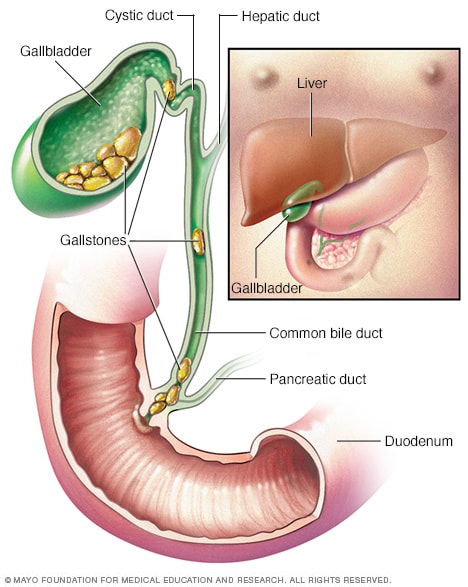How you prepare
Food and medications
To prepare for a cholecystectomy, your surgeon may ask you to:
- Eat nothing the night before your surgery. You may drink a sip of water with your medications, but avoid eating and drinking at least four hours before your surgery.
- Stop taking certain medications and supplements. Tell your doctor about all the medications and supplements you take. Continue taking most medications as prescribed. Your doctor may ask you to stop taking certain medications and supplements because they may increase your risk of bleeding.
Clothing and personal items
Most people go home the same day of their cholecystectomy, but complications can occur that require one or more nights in the hospital. Plan ahead in case you need to stay in the hospital by bringing personal items, such as your toothbrush, comfortable clothing, and books or magazines to pass the time.
Other precautions
Find someone to drive you home and stay with you. Ask a friend or family member to drive you home and stay close the first night after surgery.
What you can expect
Before the procedure
A cholecystectomy is performed using general anesthesia, so you won't be aware during the procedure. Anesthesia drugs are given through a vein in your arm. Once the drugs take effect, your health care team will insert a tube down your throat to help you breathe. Your surgeon then performs the cholecystectomy using either a laparoscopic or open procedure.

During the procedure
Depending on your situation, your surgeon will recommend one of two surgical approaches:
Minimally invasive (laparoscopic) cholecystectomy
During a laparoscopic cholecystectomy, the surgeon makes four small incisions in your abdomen. A tube with a tiny video camera is inserted into your abdomen through one of the incisions. Your surgeon watches a video monitor in the operating room while using surgical tools inserted through the other incisions in your abdomen to remove your gallbladder.
Next you may undergo an imaging test, such as an X-ray or ultrasound, if your surgeon is concerned about possible gallstones or other problems in your bile duct. Then your incisions are sutured, and you're taken to a recovery area. A laparoscopic cholecystectomy takes one or two hours.
A laparoscopic cholecystectomy isn't appropriate for everyone. In some cases your surgeon may begin with a laparoscopic approach and find it necessary to make a larger incision because of scar tissue from previous operations or complications.
After the procedure
You'll be taken to a recovery area as the anesthesia drugs wear off. Then you'll be taken to a hospital room to continue recovery. Recovery varies depending on your procedure:
- Laparoscopic cholecystectomy. People are often able to go home the same day as their surgery, though sometimes a one-night stay in the hospital is needed. In general, you can expect to go home once you're able to eat and drink without pain and are able to walk unaided. It takes about a week to fully recover.
- Open cholecystectomy. Expect to spend two or three days in the hospital recovering. Once at home, it may take four to six weeks to fully recover.


